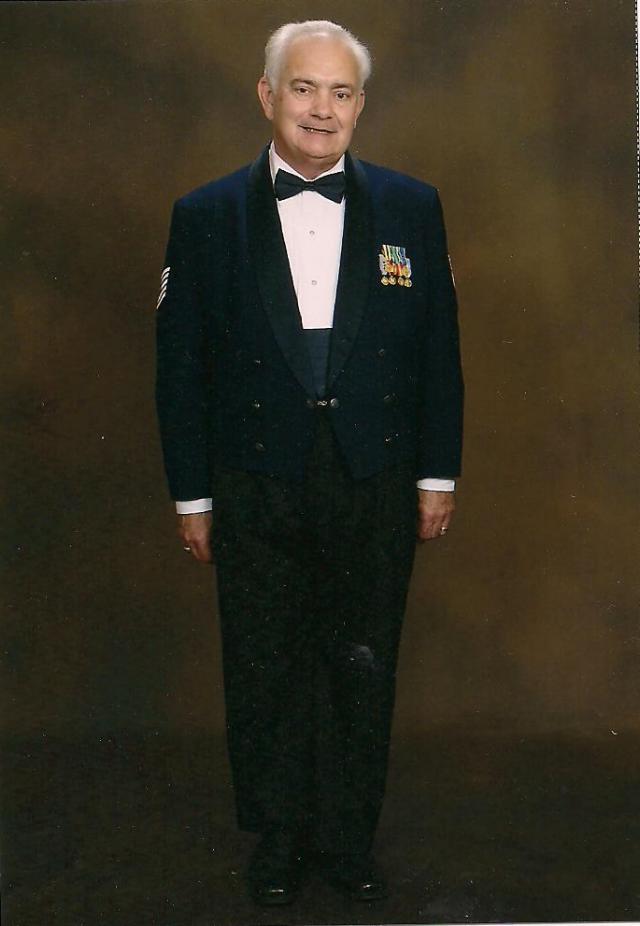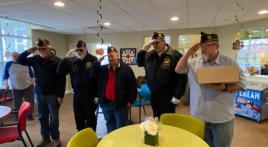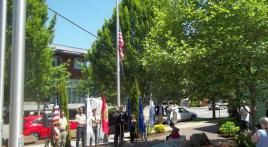John “Mac” McCormick spent his military career in the U.S. Air Force and Army, first as a broadcaster and later as a mortuary affairs NCO. He went to Vietnam, Korea and Panama. After nearly 25 years he retired — well sort of.
McCormick, now 63 years old, is one of those veterans who just won’t fade away. In fact it is hard to keep up with him. At a point in life when some would be content with a quieter, more sedentary life, McCormick has put his heart and soul into yet another new venture, but his military service remains an integral part of his life.
From his early days, McCormick had relatives whose military experiences served to influence him in his decision to serve his country. An uncle initially saw action as a Marine and survived the attack on Pearl Harbor, before transferring to the newly created Air Force. Another uncle was in the Army Air Force and rose to the rank of first sergeant, and also transferred to the new Air Force as soon as he was able.
“They were great role models,” McCormick remembered fondly.
It was this eclectic mix of military work experience which ultimately would lead McCormick to new careers once he left the military.
At the height of the Vietnam War in 1968, McCormick, who was fresh out of high school in Pennsylvania, decided to enlist in the United States Air Force. McCormick served for more than two decades in the military – including periods in the Air Force National Guard and Army National Guard, as well as the U.S. Army - and had jobs which seemed so opposite in skills. At one point, he served as a mortuary affairs sergeant. But later McCormick would transition into being an armed forces broadcaster. Both jobs, as will be shown, served McCormick well in his later life.
In 1979, McCormick was involved in a tense and frightening situation in which the enemy was Mother Nature. He was one of the brave men involved in the rescue mission after a typhoon hit mainland Japan, triggering a gasoline fire at Camp Fuji, the U.S. Marine base. For his heroism, he received a received a letter of commendation from a commanding U.S. Marine Corp. general. In fact, McCormick received a number of awards and commendations in the course of his military career, including the Army Achievement Medal, and several Keith L. Ware awards (named for an American general who was killed in Vietnam), for his newscasts and radio programming. McCormick was also nominated, in 1988, for Army broadcaster of the year, in recognition of his work which provided important news and information to U.S. military personnel and their families.
His assignments as a military journalist may at first glance seemed to be one of the easiest in the military but it proved to be of vital importance to American personnel stationed in Panama. As it turned out, McCormick was in that Central American country during the oppressive regime of Manuel Noriega, the general who ruled in Panama with an iron hand. Censorship was the rule of the day there and. McCormick’s broadcasts were the only source of news for Panamanians that was not subject to the control of Noriega’s censors. In fact, the importance of McCormick’s job as a pipeline for reliable information to Panamanians was featured in a New York Times article, complete with a photo of McCormick on the broadcast news set.
McCormick remembered: “In Panama, I was the one whose face was on air… Initially, Noriega, our friend, became more of a tyrant and dictator.”
What made the flow of information so limited for Panamanians, McCormick remembered, was that American news organizations which broadcast to Panama via satellite performed their own form of self-censorship, not including stories deemed objectionable to Noriega. As a result, McCormick’s broadcasts from the American base in Panama were usually the only ones Panamanians could receive which dealt with Noriega’s wrongdoings and human rights abuses.
But McCormick’s actions caused him problems and put him in personal danger. McCormick regularly had to travel by car from his home at Fort Amador to the base at Fort Clayton. To smooth the way past Panamanian guards, McCormick kept some cigarettes, money, whiskey and cigars with him in case he needed to entice them to let him pass without a problem. But one day nothing would help him get past a vehicle roadblock and McCormick was roughed up and arrested on a bogus charge of showing disrespect to Noriega. Ultimately, U.S. Ambassador Arthur Davis had to intercede to get McCormick released.
However, these experiences, coupled with what McCormick had seen in Vietnam, led to a diagnosis later of post-traumatic stress disorder. In 1993, McCormick officially retired from the military, although he remained active in the Pennsylvania Air National Guard and the Pennsylvania Army National Guard.
While in the service, McCormick had a hand in mortuary activities, including graves registration. So, upon retirement, McCormick decided to act on an old interest and became licensed as a funeral director, after also completing his Bachelor of Arts degree in journalism. He also contributed to the industry by writing for trade publications, his first experience actually coming in 1975 when he penned a story titled “A Soldier’s Funeral in Izmir,” an article based on events in Turkey. That first taste of being a published author eventually led to a smorgasbord of more than 600 articles about the funeral profession. Eventually, in 2001, some of McCormick’s works were incorporated into a book titled "Days of Death Nights of Service."
In 2011, McCormick moved to Milford, Del., with his fiancée, Natalie Brunner. Two years later, they were married. While no longer actively working as a funeral director, McCormick, a stepfather and granddad made his way quite by chance into another career: beach glass and vintage bottle collecting. It was something that captured his interest on a long ago vacation in Maine, where he recalled discovering “the joy of searching for the brilliant colors of the sea, or beach glass.” he recalled.
In time, McCormick added vintage glass bottles –- some dating from the 19th century - to his collection and soon a new business was born: By The Beach Vintage Glass & Bottles.
His years in the military coupled with his career as a funeral director have made McCormick realistic about death. He has already penned his own obituary and planned his own funeral. With that taken care of, McCormick enjoys life with an eye open to new adventures. Still, his military life is always with him.
“The military helped me in all phases of my life,” McCormick often says proudly.





